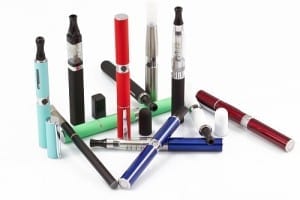
The vaping industry has significantly changed in the 10 years since Vapor Voice started publishing.
By Timothy S. Donahue
The vaping industry has changed dramatically during the past decade. When Vapor Voice published its first issue in 2014, the e-cigarette industry was about six years old and still in its infancy. Cig-a-likes and tobacco flavors were still popular, but flavors and mods started taking off. In an online article on Dec. 14, 2019, Vapor Voice reported that Clearette was named “Best E-Cigarette and Vapor Line of 2014” in a competition organized by ECig Review Central.
ECig Review Central gathered 25 leading vapor enthusiasts from around the United States. The judges were blindfolded and sampled 20 prominent e-cigarette brands over six hours. “I liked the bold e-cigs the best,” said one judge. “The throat hit was perfect, and the draw was extremely smooth.”
Each tester was given a 15-minute to 20-minute break between individual e-cigarettes. Judges rated taste, quality and delivery on a scale of one to 10. In 2014, 21 out of 25 judges rated Clearette’s line as the best tasting. “The entire line was incredible,” stated another judge. “I was thinking it might be a tobacco company’s, but it wasn’t. The vapor tasted just like smoke.” Sadly, like many early vapor companies, Clearette and ECig Review Central are no longer in business.
These early devices provided little vapor, and battery life was short compared to today’s products. One early industry leader, Njoy, is still producing products, albeit now under the Altria umbrella. The difference between Njoy’s original Daily disposable and its current Daily disposable exemplifies the vapor industry’s technological growth. In addition, Njoy’s Ace pod system is the most technologically advanced vaping product to have received marketing authorization from the U.S. Food and Drug Administration.
Vapor Voice’s first print edition followed Altria’s announcement to launch its MarkTen e-cigarette nationwide. Altria also purchased Green Smoke for $110 million in cash and up to $20 million in incentive payments. Both the MarkTen and Green Smoke products are no longer on the market. Later that year, Greg Conley started the American Vaping Association, a nonprofit vapor industry advocacy organization that has now become part of the American Vapor Manufacturers Association, and the Oxford English Dictionary voted “vape” as the word of the year. Philip Morris International also launched its heated-tobacco product, IQOS, in Milan, Italy, and Nagoya, Japan.
In 2014, the U.S. Food and Drug Administration also released its proposed rule for extending its authority to all tobacco products, including e-cigarettes, cigars, hookah and pipe tobacco (“the deeming rule”). The new regulations for electronic nicotine-delivery system (ENDS) products were finalized in 2016. The final deeming regulations were officially published on May 10, 2016, and became effective 90 days later on Aug. 8, 2016.
The deeming rule changed the vaping industry. Many would say it nearly decimated it. The FDA’s channels for manufacturers and retailers to gain permission to sell their products threatened to put them out of business. According to the Brooklyn Law Review in a 2017 paper, “Through the far-reaching ‘Deeming Rule,’ e-cigarette manufacturers are forced to comply with financially burdensome and time-consuming requirements before taking most of their products to market.”
The Juul Experience

In 2015, we had our first introduction to Juul Labs. During a tobacco industry event in New York, Brian Haynes, with Troutman Pepper, and myself were shown a Juul device by Gal Cohen, Juul Labs’ head of Scientific and Regulatory Affairs. We snuck off into the back corner of a bar together, and he let us both take a few puffs. He wouldn’t let us have one. It blew our minds. We knew then that it was potentially an industry-altering product.
Juul altered the industry too. Its impact could be summed up as “the good, the bad and the ugly.” The good was that Juul was a technological marvel at the time. The Juul device helped smokers switch to vaping faster than any product before it. Sales began to soar. Juul was the catalyst for the rapid growth of the vaping industry from 2016 to 2019.
In 2017, Kevin Burns joined Juul Labs as CEO about two years after the company launched Juul. Juul was estimated to make up about 40 percent of the e-cigarette industry at that time. Then, in December 2018, Altria Group invested $12.8 billion in Juul Labs, acquiring a 35 percent interest and valuing the company at $38 billion. Altria claimed Juul Labs would remain a fully independent company.
Soon after Altria’s investment, Juul Labs began to decline. The company and its advertising practices came under fire. The FDA accused Juul of creating a vaping “epidemic” by hooking youth on vapes, and Burns even went as far as to say he would apologize to parents whose “children were addicted to the company’s products” as concern grew around the teen vaping epidemic.
There was also the great EVALI scare. The outbreak of “e-cigarette or vaping product use-associated lung injury,” to use the outbreak’s official but misleading name, started in 2019 and was caused by illegal, unregulated cannabis vaping products laced with vitamin E acetate. The U.S. Centers for Disease Control and Prevention, however, wrongly blamed nicotine vaping products. This episode, too, almost ended the e-cigarette industry.
EVALI and the youth “epidemic” became too much of a burden for Juul Labs. Burns resigned as CEO of the company in September 2019. K.C. Crosthwaite, who was serving as the chief growth officer for Altria, was named his successor. In October 2019, Juul Labs announced it would be laying off about 500 employees by the end of the year. Several Juul Labs executives also moved on from the troubled company that year.

Stung by Juul’s disappointing performance, Altria announced in October 2019 that it was reducing the value of its investment in Juul by $4.5 billion. In January 2020, the FDA issued a policy prioritizing enforcement against unauthorized flavored e-cigarette products that appeal to kids, including fruit and mint flavors. However, the flavor restriction didn’t apply to disposable e-cigarettes. “Under this policy, companies that do not cease manufacture, distribution and sale of unauthorized flavored cartridge-based e-cigarettes (other than tobacco or menthol) within 30 days risk FDA enforcement actions,” the agency stated.
Juul subsequently pulled all its flavored pods from the U.S. market except for tobacco and menthol. The impact of the FDA’s rule was devastating for the pod-based Juul and all other pod-based vaping systems. By October 2020, Altria further reduced Juul’s valuation to approximately $10 billion. By March 2021, the valuation was cut to $4.3 billion; by March 2022, it was reduced to $1.6 billion. In July 2022, the valuation of Juul Labs was further cut down to $450 million, which was only 3.5 percent of its original value.
The fall of Juul may go on to be one of the most significant corporate collapses of this century. Coupled with the FDA’s nonenforcement policy of flavored disposable vaping products, Juul Labs’ downfall caused substantial changes in the vaping industry. No longer were pod systems a dominant force. Instead, sales of disposable vaping products exploded.
Disposables are King

The vapor industry has grown dramatically since Vapor Voice started publishing. In 2014, the vaping industry was worth an estimated $7.2 billion, according to Statista. In 2023, its value had grown to more than $23 billion. The global vaping industry is expected to reach more than $26 billion by 2028. The disposable e-cigarette market size was valued at $5.7 billion in 2021 and is poised to grow from $6.8 billion in 2022 to $14.8 billion by 2030, according to SkyQuest Technology.
While favored by consumers, disposable products present their own issues for the industry. It started with the rise of Puff Bar, which entered the U.S. market in 2019. At the time, it was owned by Cool Clouds Distribution of California. Cool Clouds sold Puff Bar to the brand’s Chinese manufacturer, DS Technology Licensing, in early 2020.
During the summer of 2020, the FDA instructed Puff Bar to stop selling its products. This decision was made because Puff Bar became a popular alternative to Juul after the latter discontinued some of its flavored products. Critics accused Puff Bar of targeting young people. In February 2021, Puff Bar resumed sales with a new design and synthetic nicotine, which, at the time, was not regulated by the FDA. Most disposable makers followed the same playbook. In 2020, U.S. lawmakers asked the FDA to force Puff Bar off the market.
Puff Bar sales began to decline; however, it wasn’t long before another disposable brand, Elf Bar, took over the market. Founded in 2007, iMiracle Shenzhen Technology was originally an e-commerce firm. In 2018, the company switched to disposable e-cigarettes and launched the Elf Bar brand with synthetic nicotine. In 2022, the FDA said it needed Congress to act to bring synthetic nicotine under its purview.
Congress closed the loophole last year. Under the new rules, companies were supposed to remove their flavored synthetic vapes from the market and file premarket tobacco product applications with the FDA. New products continued to be launched anyway. Puff Bar and Elf Bar began introducing products under different brand names, and thousands of other manufacturers followed suit.
This is where the industry stands today. Disposables dominate the market while pod systems continue to trail far behind. However, the FDA has tried to clamp down on the growth of illegal disposables. The agency has issued over 550 warning letters and more than 100 civil money penalty actions to retailers for selling unauthorized e-cigarettes.
Primarily, the regulatory agency’s actions have proved ineffective. Few retailers responded to the FDA’s actions. This has forced many states to step in. Due to the federal agency’s inability to control illegal flavored products, many state legislatures have introduced premarket tobacco product application (PMTA) registry bills. These bills require retailers only to sell products on a state list filled with products authorized by the FDA (of which there are only 23) and products with a PMTA under review by the regulatory agency. The Consumer Advocates for Smoke-Free Alternatives Association (CASAA) has issued calls to action for several registry bills. Vaping companies are also being sued for selling flavored disposables without authorization.

Altria and BAT subsidiary R.J. Reynolds (the maker of Vuse vaping products) have taken legal action to kill their vape competition. Last October, Altria subsidiary Njoy filed a lawsuit in a federal district court against dozens of manufacturers, distributors and retailers of disposable vapes, including the Breeze, Elf Bar, Esco Bar, Flum, Juice Box, Lava Plus, Loon, Lost Mary, Mr. Fog and Puff Bar brands. Njoy asked the court to bar imports by the companies and said it would “consider further litigation activity.”
In January, a U.S. District Court in California dismissed the lawsuit against many of the disposable vape manufacturers, distributors and retailers. The court found that the defendants did not participate in “the same transaction, occurrence or series of transactions or occurrences,” and therefore were improperly joined in the lawsuit. However, the case against iMiracle, the manufacturer of Elf Bar, has not been dismissed. The case is still pending.
The environmental impact of disposables is also a growing issue. Many companies are moving away from these products as more countries and U.S. states seek to ban them. Martin Miller, Chief Commercial Officer for Plxsur, a company that recently reached $1 billion in consolidated revenues, (see “Keeping Pace,” pg. 18) said safeguarding the environment and delivering safe and innovative products are core to the company’s sustainability agenda.
“We have worked closely with our partner companies to put in place commercial strategies to migrate consumers away from disposables. Our Italian business, Puff [no relation to Puff Bar], has already successfully migrated many of its consumers using disposables to pod and open devices,” he said. “These alternative products have already outperformed legacy single-use vapes by volume. Adding to this, migration away from disposables is present across our entire group, with Ireland-based Hale having already launched a new pod system and others with an ever-growing portfolio of owned and third-party pod systems.”
The e-cigarette industry is still growing rapidly. The Federal Trade Commission issued its third report on e-cigarette sales and advertising nationwide in April. The report found that combined sales of cartridge-based and disposable e-cigarette products to U.S. consumers by nine leading manufacturers increased by approximately $370 million between 2020 and 2021. The total topped $2.67 billion. E-cigarette companies spent $90.6 million more advertising and promoting their products in 2021 than in 2020.
Reported sales of cartridge products increased from $2.133 billion in 2020 to $2.496 billion in 2021; sales of disposable, non-refillable e-cigarette products increased from $261.9 million in 2020 to $267.1 million in 2021. As technology improves and new products come to market, vaping products will continue to save the lives of many combustible tobacco smokers. That’s one thing that isn’t going to change any time soon.




